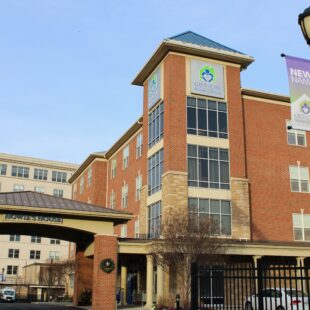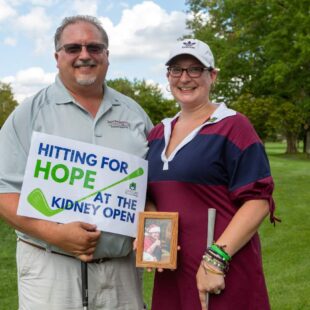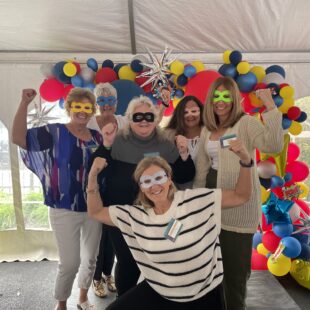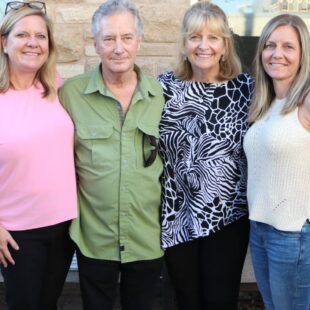Resources for Caregivers
The Gift of Life Howie's House Social Worker is available to help answer questions, provide support, and identify resources as you and your loved ones go through the transplant process. The social worker may be able to assist with issues related to the topics below.
One-on-One Support Services
- Travel, lodging, and medications
- Financial concerns or work-related concerns
- Coping with the wait before and after the transplant
- Navigating the hospital system and working with your transplant team
- Connecting you to transplant or caregiver support groups
The Gift of Life Howie’s House Social Worker can be reached at 267-546-9800 or email CaregiverLifeline@GiftofLifeFamilyHouse.org
Online Support Resources and Education
Gift of Life Howie’s House Facebook Caregiver Support Group: A Facebook Support Group specifically for caregivers of transplant patients with the goal of creating an intimate online community for caregivers to connect with one another and develop tools to promote self-care and positive ways of coping with stress.
Gift of Life Howie’s House Caregiver Lifeline Program: A wide variety of articles and resources to help patients and families understand and cope with the transplant process.
Gift of Life Donor Program: Information about regional and national resources to learn about transplant, support for transplant families and patients, available volunteering opportunities, and writing to your donor family.
Transplant Living: Information and education on the entire transplant process. Overseen by the United Network for Organ Sharing (UNOS), is a great resource for patients and families at any stage of the transplant process.
Caring.com Support Groups: Provides caregiving tips, advice, and support in the online support groups for caregivers in general (not transplant specific). This website also offers a space where caregivers can share, vent, laugh, and connect with others.
Support and Volunteer Groups
There are many support and volunteer groups throughout the Gift of Life region (eastern half of PA, southern NJ and all of DE). Visit here for more information.
Other support groups can be found below:
Transplantliving.org/community/support-groups
Additionally, many support groups can be found through Facebook. If you already have a Facebook account, go to the main page and search the type of group you are looking for. For instance, a heart transplant patient might search for “heart transplant support group.” An example group can be found here.
Additional Mental Health Resources
Substance Abuse and Mental Health Services Administration: 1-800-662-HELP (4357) or TTY: 1-800-487-4889 | National helpline that provides 24-hour free and confidential treatment referral and information about mental and/or substance use disorders, prevention, and recovery in English and Spanish.
Suicide Prevention Lifeline: 800-273-TALK (8255) or TTY: 1-800-487-4889 | 24-hour, toll-free, confidential suicide prevention hotline available to anyone in suicidal crisis or emotional distress. Your call is routed to the nearest crisis center in the national network of more than 150 crisis centers.
Veterans Crisis Line: 1-800-273-8255 and then choose option 1 | Connects veterans in crisis (and their families and friends) with qualified, caring, Department of Veteran Affairs responders through a confidential, toll-free hotline, online chat, or text.
Insurance
You can contact the social worker if you are having difficulty navigating your plan.
Medicare: Federal program with universal coverage throughout the U.S. covers 80% of costs. You may need an insurance supplement to cover the remaining 20% of costs.
Medical Assistance: May cover lodging and travel. Coverage varies state to state.
Private Health Insurance: Coverage varies, but be sure to ask for your insurance’s Transplant Case Manager.
Questions to ask your private health insurer:
- Is my transplant center in-network with my insurance company?
- If my transplant center is out-of-network, do I have an out-of-network benefit for transplant?
- What deductibles or co-payments for doctor visits, hospitalizations and medications will I have?
- Does my plan require prior authorization and how?
- Does my plan have a lifetime maximum or “cap” for transplant services?
- Does my plan have a travel/lodging benefit?
The Transplant Living website provides a good overview. See “Before the Transplant” and select “Financing the Transplant.”
Transplant Fundraising
The costs of transplant can vary and patients typically use several sources to help pay for their medical and non-medical costs before and after transplantation (ex: mileage, lodging, copays, deductibles, and food.) Fundraising is easier than you think. These organizations provide help and tools for getting started.
Help Hope Live: 800-642-8399
National Foundation for Transplants: 901-684-1697
Children’s Organ Transplantation Association: 800-366-2682 (specifically for children and young adults)
Your community resources: Your church, school, community center, or a club can host fundraisers. All you have to do is ask.
Travel Support
Please note that the below services do not provide emergency flights. All flights must be coordinated ahead of time.
Patient Airlift Services: 631-694-7257 | Arranges volunteer medical flights and free air transportation for needy individuals throughout the greater Northeast region, from Virginia to Maine, Ohio to Massachusetts.
Air Care Alliance/Angel Flights: 888-260-9707 | Has a directory of more than sixty groups with volunteer pilots who will fly patients for care or provide other flights or aviation services to help those in need or serve our communities.
Air Charity Network: 877-621-7177 | A charitable organization that provides access for people in need who are seeking free air transportation to specialized health care facilities or distant destinations due to family, community, or national crisis.
Prescription Coverage Assistance
If you have any issues obtaining your medications or concerns about future coverage, immediately contact your Transplant Coordinator and Transplant Social Worker at the hospital.
If you have copays, some grants might help you cover these costs. Please reach out to the Gift of Life Howie’s House Social Worker or Transplant Social Worker to see if there are resources for support.
The Medicare Extra Help program can help with prescription costs. This program is available to persons receiving Medicare, with limited resources and income, and residing in one of the 50 States or the District of Columbia.
The PA Department of Aging can link you to many different resources, including the Pennsylvania Pharmaceutical Assistance Program for the Elderly (PACE).
Many drug manufacturers offer patient assistance programs for prescribed immunosuppressive medications, which your Hospital Transplant Social Worker can help you access.
For more information, call the Gift of Life Howie’s House Social Worker at 267-546-9800 or email CaregiverLifeline@GiftofLifeFamilyHouse.org.







